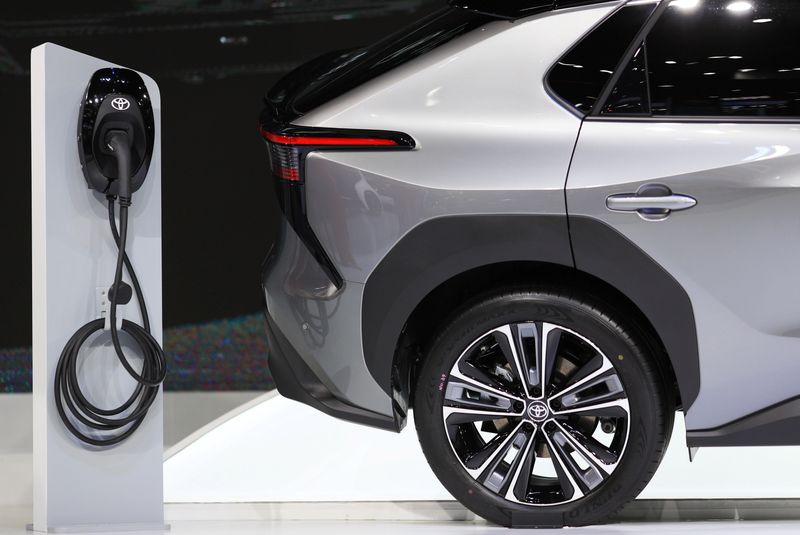By Daniel Leussink
TOKYO (Reuters) -Toyota will introduce high-performance, solid-state batteries and other technologies to improve the driving range and cut costs of future electric vehicles (EVs), the automaker said on Tuesday, a strategic pivot that sent its shares higher.
The Japanese giant's technology roadmap, covering aspects as varied as next-generation battery development and a radical redesign of factories, amounted to the automaker's fullest disclosure of its plan to compete in the fast-growing market for EVs where it has lagged rivals led by Tesla (NASDAQ:TSLA).
The plan comes a day before an annual shareholders meeting where governance and strategy - including a slow pivot to battery EVs under former CEO Akio Toyoda - will be scrutinised.
Shares of the world's best-selling automaker jumped 5% on the day to 2,173 yen, the highest since August.
Toyota said it aims to launch next-generation lithium-ion batteries from 2026 offering longer ranges and quicker charging.
It also trumpeted a "technological breakthrough" that addresses durability problems in solid-state batteries and said it is developing means to mass produce those batteries, targeting commercialisation over 2027-2028.
Solid-state batteries can hold more energy than current liquid electrolyte batteries. Automakers and analysts expect them to speed transition to EVs by addressing a major consumer concern: range.
Still, such batteries are expensive and likely to remain so for years. Toyota will hedge with better-performing lithium iron phosphate batteries, a cheaper alternative to lithium-ion batteries that have spurred EV adoption in China, the world's largest vehicle market.
At the high end of the market, Toyota said it would produce an EV with a more efficient lithium-ion battery offering a range of 1,000 km (621 miles). By comparison, the long-range version of the lithium-ion-powered Tesla Model Y, the world's best-selling EV, can drive for about 530 km based on U.S. standards.
An EV powered by a solid-state battery would have a range of 1,200 km and charging time of just 10 minutes, Toyota said. By comparison, the Tesla Supercharger network - the largest of its kind - offers the equivalent of 321 km of charge in 15 minutes.
Toyota did not detail expected costs or required investment for the plans.
Engineers at the automaker have been considering a reboot of its EV strategy since last year to better compete.
The roadmap detailed on Tuesday showed that under new CEO Koji Sato, Toyota has adopted much of the revamp that engineers and planners have been developing as options for months.
That includes use of electric-axle and other technology from suppliers such as Aisin and Denso.
"What we want to achieve is to change the future with BEVs," Takero Kato, president of new Toyota EV unit BEV Factory, said in a video posted on the automaker's YouTube channel on Tuesday.
NEW ASSEMBLY TECHNOLOGY
Toyota said it was developing a dedicated EV platform to reduce the cost of new models and a heavily automated assembly line that would do away with the conveyor belt system that has defined auto production since Henry Ford over 100 years ago.
In Toyota's "self-propelling" assembly line, cars under production would drive themselves through the process.
It also said it would use Giga casting to cut production costs, adopting an innovation pioneered by Tesla using massive, aluminium casting machines to reduce vehicle complexity.
Koji Endo, senior analyst at SBI Securities, said he was surprised by Toyota's move to counter Tesla's lead in production efficiency. "I'm not sure yet Toyota can push back in a counter offensive, but it's getting ready to try," he said.
Toyota's BEV Factory, established in May, aims to produce about 1.7 million vehicles by 2030, Kato said - about half of the 3.5 million EVs Toyota aims to sell annually by that year.
In April, the automaker sold 8,584 EVs worldwide, including under its Lexus brand, accounting for more than 1% of its global sales in a single month for the first time.

Toyota sold almost 10.5 million vehicles in 2022, and has a market value of about $254 billion. By contrast, Tesla sold one-eighth as many vehicles yet is valued at around $791 billion, a premium reflecting investor belief in Tesla's growth potential.
Toyota has long said it wants to offer consumers a choice of new-energy vehicles, including petrol-electric hybrids and hydrogen fuel cells as well as battery EVs, as part of the industry's transition from petrol-powered vehicles.